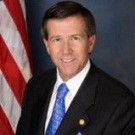
Kudos to D.C. newspaper
the Hill for asking U.S. Representative
John Campbell the question that's been in the back of our minds ever since we read that the
Office of Congressional Ethics was investigating him: Didn't Campbell, a former car salesman and auto executive, do a 180 on own conflict-of-interest policy?
]
In December, he voted “present” on whether the U.S. government should bail out General Motors and Chrysler. At the time, he said that he couldn't vote “yes” or “no” because he had conflict of interest, as he still owns property leased to auto dealerships.
Over the course of the past year, though, Campbell has worked to shape the House of Representative's financial-services reform bill so as to spare franchised auto dealerships from new regulation. His involvement in helping to kill an amendment that would have regulated such dealerships is part of what attracted the attention congressional ethics investigators. And he offered his own amendment to the bill, which Reuters
identified as a “blatant conflict of interest.”So in one instance, Campbell abstains from auto-related legislating because of ethics, and in another he dives right in. What gives?
The Hill reports that Campbell says he consulted with the House ethics committee in both cases to see whether he should recuse himself; in both cases, the answer was, “you don't need to.” But Campbell personally felt he had a conflict with the bailouts. He didn't feel that way with financial regulation. See if you can discern exactly why from his explanation, because we're a little lost:
“I don't have an interest in an operating dealership and I did not believe I had any conflict of interest at all,” he said. “The difference [was] between bailing out an auto company by name — the auto bailout was only GM and Chrysler — versus a bill that could impact the operation of 20,000 businesses across the country in which I have no direct interest … I felt there was a difference between those two circumstances.”
Campbell was the No. 1 recipient of car-industry campaign contributions in the 2006 election cycle, and No. 2 in the 2008 cycle. He called the investigation into him “semi-random.” Today is the deadline for the Office of Congressional Ethics to decide whether that investigation moves forward. Read more about the ethical snafu here.


